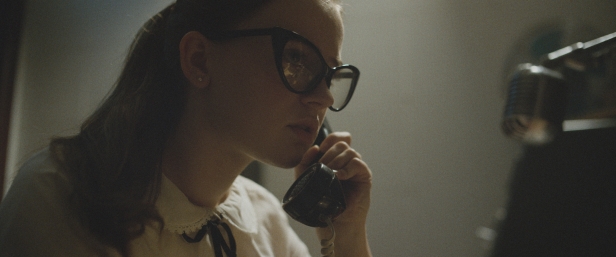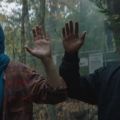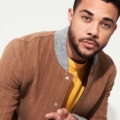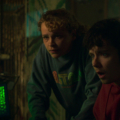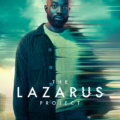The Vast Of Night has been incredibly well-received. Did you have any idea it would be so successful when you first read the script?
I always thought the film was amazing and incredible but as is the case with any independent film, you have no idea if anyone will ever see it. Most films that I’m shooting that are small, independent and low budget, I don’t ever know if people are going to see it. Since shooting The Vast Of Night, we’ve just had this wonderful reception. So many people have been able to watch it. That’s ten times what I had expected and it’s wonderful.
How did you get involved in the movie?
The script came to me through my manager. I get a lot of scripts like that and so I sat down to read it. I wasn’t necessarily expecting a whole lot just because I try not to go in with too many expectations in the first place, but once I’d finished the script, I was absolutely floored. I was like ‘I need to do whatever I can to be a part of this’.
I [then] had a discussion with [director] Andrew [Patterson] over Skype; we talked about the film, geeked out about movies and after that discussion, I taped two scenes, I sent them off, I waited. Then because I was so struck by the character, the script and Andrew as a director, I sent a text message to him saying ‘please please please, I will work harder than anyone I promise!’. Then after that I got to be involved!
What do you look for when choosing to do a movie?
What I typically look for is something I haven’t done before; a new opportunity and a new actor muscle to flex. That’s always a huge attractive thing to me when I’m reading a script or a potential project. But the character is the most important [aspect] in my opinion, especially as a female. I pretty much turn down any dumb female character, like really flat, at least if I can. [My character in The Vast Of Night] Fay isn’t like that and so that really really jumped out at me. The fact that she was so multi-faceted and interesting and different.
Can you tell us more about your character, Fay?
Fay has this wonderful arc throughout the film where in the beginning she’s very hesitant to assert herself and then by the end she’s leading the adventure. So that was definitely something that jumped out at me and made me really really want to sign on. She has this wonderful character growth that happens over the course of this one night. This brief slice of time that this film represents. She starts by being herself, which is kind of bubbly and sweet but still hesitant to assert herself and is easily embarrassed. And then over the course of this night, going on this adventure, gives her all this confidence where she’s leading Everett. Eventually [this] allows her to find this confidence she never might have had in other situations and I really was attracted by that.
By the end of this film she’s taking charge, leading the adventure, bossing Everett around, telling him what to do. I love the idea of [this] female character – her intelligence and her interest leading to this character change and this new confidence she has. That was a huge part of the film and the script that I was very very attracted to.
She’s clearly very intelligent, though there’s a very touching scene where she says she wouldn’t be able to attend college…
An even further layer to the character of Fay [was] acknowledging the fact that someone like her from a small town, without a wealthy background, wouldn’t even dream of attending college. That’s probably not terribly different now, at least in the United States. But the fact that Fay has all this knowledge and would love to go to college but already expects herself not to be able to is this very sad, but very real, little spot in the film. Jake, Andrew and I always really love that scene where Jake and I are listening to all the tapes and we talk about the fact that I’d love to go to college but can’t afford it. That’s a really wonderful, very touching downplayed scene that I love. They’re very nonchalantly listening to tapes and talking about their futures. It’s a very integrated, natural way that exposition comes. I really love that part of the film particularly.
In the movie, Fay works on the switchboard which looked very difficult to master! Did you do any research beforehand on how they worked?
There’s a lot of footage on YouTube of women operating switchboards back in the Fifties when Fay would have been doing it and I felt like that switchboard aspect was a really important anchoring aspect of the film. That’s how all this conflict starts. It gets kicked off by her being at the switchboard and hearing something at the switchboard.
I also felt it was a really important aspect of Fay’s character because it represents this technology that she’s fascinated by, as well as this job that she has that she’s very proud of and allows her to be independent. I felt like operating the switchboard was a super important part of Fay’s character. So I wanted to make sure that that was super effortless and not what I was thinking of on the day [we shot that scene].
They actually moved a switchboard into my hotel room and I would come back from rehearsal or shooting and I would just practice all night. I noticed when I was watching the footage of the women they all had this swift efficient flick of the wrist motion when they would take the jack, plug it in and release it, take the jack, plug it in and release it over and over again. I wanted to really capture that. It’s a very subtle indicator that Fay does this all the time and she’s really proficient in knowing about it.
For that scene when I’m at the switchboard for a fairly long time, I had a lot of other things to be thinking about. Most notably actor things – in the scene I’m calling a bunch of different people and I had to bear that in mind. And also Andrew essentially told me, ‘I’m not going to save you in editing so you need to actually get the switchboard stuff down’. So I actually operated the switchboard in the film according to how it would have been operated at the time.
When we showed the film at Palm Springs Film Festival there was an audience member there who was like 80 years old who said that he had been a switchboard operator in Texas kind of around that time and he said the film did a really good job, and that all the switchboard technology is authentic. I thought that was cool, and another layer that I really enjoyed getting to sink my teeth into and play around with.
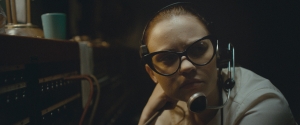
With The Vast Of Night being set in the Fifties, did you keep the time period in mind when preparing to play Fay?
Initially, I started with Fay’s innermost qualities; the things that exist about her regardless of time or place. Those were her curiosity, her fastidiousness, her kindness, her sweetness, her very genuine nature, and all this excitement she has about the future, but she’s still a very shy, very responsible girl. So I started with those kinds of qualities first and then worked outwards.
The time period did help do the character work, especially the wardrobe. The look of the character is very specific and very different from the way I look in real life. That was a really huge performance aid for me, it helped me divorce my physical self or my physical inclinations from Fay and have a completely blank slate to start from scratch.
The wardrobe, the glasses the hairstyle, all that was a huge help for me because it allowed me to fine-tune different aspects of Fay. She has this big sort of fluttery skirt and this plain schoolgirl white shirt. So [I played] with those clothing items and the outfit and the physicality of Fay – I really wanted to be seen as small and a little bit clumsy.
There is a lot of heavy dialogue in the film, especially between you and Jake Horowitz who plays Everett, how did you tackle that element?
Jake and I had a lot of time, more so that you usually get on films of this size and so we had a lot of time to rehearse those heavy dialogue scenes. I think because of that, by the time we got to the actual day to shoot them we were pretty comfortable. We had had all the time to explore these characters and explore the dialogue and how it feels in your mouth. [To also] try and tie that very period vernacular to other things that you and I say colloquially today to try and naturalise it. Jake and I had all this time to do all that, get the screens really down in our heads and then really settle into our characters. So that by the time we actually got on set we had a pretty relaxed time with it.
That’s not to say that everything went completely perfectly all the time! Nothing does on a film set. [But] we felt super comfortable, we felt super at ease. I think the fact that we felt so at ease and natural about it, it sort of informs the relationship that Fay and Everett have on screen. The relationship is so effortless and friendly and natural. And I think that’s because Jake and I had all this time to really develop that relationship and to rehearse a lot.
Everett and Fay are very different characters. The former is a realist whilst the latter immediately believes in the strange stories that are being told in the movie…
Between Everett and Fay, Fay is definitely the one that genuinely believes that something is happening the entire time, from the start of the movie to the end. Everett kind of has to be convinced over the course of the movie. But I wanted to really make sure that the excitement Fay is feeling at something happening in this small town [was shown]. I really wanted to portray the fact that something like this never happens to someone who has been in this small town their entire life and never had any sort of aspiration to be in the big city or anything like that. I really wanted to make sure that came across in Fay through the whole movie almost.
She is very enthusiastic about everything. I think that’s one aspect of the character that I am very similar to in life. Harnessing the enthusiasm and excitement wasn’t very hard because I feel like I’m pretty enthusiastic and excited most of the time in life! I really wanted to make sure the audience, living through Fay, can feel that same excitement to stumble upon some kind of mystery that you’re convinced was really aliens or a UFO or some unexplained occurrence. I really wanted to portray just how exciting that would be for someone Fay’s age and in Fay’s time and place. I really wanted to make sure that came across.
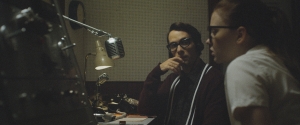
The movie has been praised for its unique direction from Andrew Patterson. Did you have any idea about these elements before you started shooting The Vast Of Night?
A lot of the very unique and poetic, beautiful camera work that appears in the film, some of it was already thought out and written in the script. So that was something that was really exciting. The script and the language that appears in the script, the very rich dialogue and the very rich descriptions of the town and characters painted a very vivid picture. [It was] very similar (at least in my brain) to the way the film looks.
After reading the script and then talking to Andrew even further about other films that he saw as influences to the way he wanted The Vast Of Night to be, gave me an even clearer picture and I was even more excited. Because the films that Andrew and I talked about were really interesting and not ones that people would typically associate with this genre and this kind of movie. Especially going in before I shot anything, I had a pretty decent idea of how the film would look but then even though I had a pretty clear idea it still blew me away when I saw it for the first time.
What films did you discuss?
Some of the films that we discussed – they’re not films that you would typically think of when you’re thinking of this movie. One was Gaspar Noé’s Irreversible and he referenced that in the way that the camera loses characters and then catches up with them and then loses them and is always hovering behind them a little bit. And then All The President’s Men was one that he mentioned that was a pretty big inspiration because if you think about it The Vast Of Night and that film are kind of similar. It’s just two people shuffling around trying to find answers to this big thing. There’s a scene with Robert Redford at the telephone – it’s one long, unbroken take that’s just on him as he’s calling different people and figuring things out and you can be there with him as he reaches this conclusion, that’s so exciting. So that scene was a huge inspiration for both Jake and I because we have kind of similar scenes ourselves in the film.
Another one was Once Upon A Time In The West just because of the very big way that people are framed in that movie and the camera work was something that Andrew referenced when we had our discussion. Those are a few and you can see why you wouldn’t necessarily associate them with the film initially but I can’t un-associate them now!
The Vast Of Night is available now on Amazon Prime. Read our review here.
